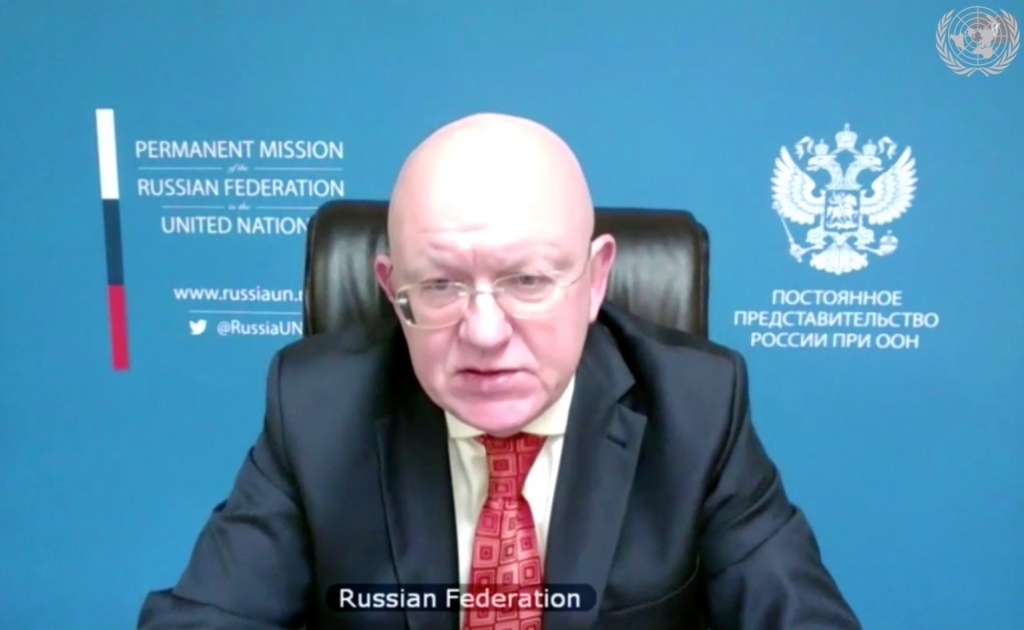Statement by Vassily Nebenzia, Permanent Representative of Russia to the UN, at the open VTC of UNSC members "Security sector reform"
Mme. Minister,
We welcome your personal participation in this VTC as President of the Security Council. This proves the importance of the topic under discussion today – reform and management of security sector, in particular in African countries.
By all means, security sector reform is one of the main elements of international assistance in the area of peacebuilding and sustaining peace.
Countries particularly need such efforts during post-conflict period, when having emerged from the most heated phase of conflict, they possess limited resources for ensuring security and therefore risk facing insurmountable challenges of terrorism and crime. In this regard, reinstating governmental power and ensuring control in all sectors, including armed forces and law enforcement, is mandatory in order to provide for lasting peace and stability, and strengthen the rule of law at the national level during the post-conflict period.
Reforms at this track enhance people’s trust in state and create favorable conditions for their return to peaceful life. Thereby, if people widely support the authorities as they carry out comprehensive reforms and respect the security forces that are being formed, it can play the decisive role in the process of national reconciliation.
Mme. President,
Transition from weak security bodies to the efficient and professional ones is never light and easy. That is why international assistance, especially that of the United Nations, is highly needed.
We assume that a state bears the main responsibility for ensuring security at its territory, therefore its government has a sovereign right to define and implement its national approaches and priorities in terms of security sector reform, given account for the needs of the population.
When the global community assists national efforts in reforming security sector, it is imperative to observe such fundamental principles as consent of affected states, respect for their national sovereignty and political independence.
When offering support in reforming the security sector to post-conflict countries, the guiding principle should be that of national ownership. Constitutional assistance must be provided only given full respect for the needs of affected states, their expertise and cultural background – in order to let them enhance their national potential. As we see from real-life cases, it is also critically important to take onboard the local country specifics.
However, and we stressed this on numerous occasions, assistance should not be perceived as attempts to impose ready-made scenarios. If we apply universal approaches to such an important and delicate domain as security, they will be rejected and may provoke recurrence of conflict situations.
We should also realize that security sector reform cannot be a cure-all remedy. By itself, it cannot make dramatic changes to the situation in a given country. To achieve practical results, the reform needs to be supplemented by other peacebuilding efforts: political process, national reconciliation, strengthening of state institutions.
Mme. President,
UN peacekeeping missions, many of which also perform peacebuilding tasks, have an important role to play in providing assistance to post-conflict countries. Whenever there is a corresponding mandate, peacekeepers are instrumental in advancing security sector reform, disarmament, demobilization and reintegration, restoring law enforcement bodies and the rule of law in general.
UN Peacebuilding Commission is also very meaningful for post-conflict recovery and conducting security sector reforms. Its assistance in developing a balanced strategy and a comprehensive approach in terms of consultative and financial support of countries on its agenda also adds to resilience of national security mechanisms.
Inter-state cooperation within one region, coordination and interaction with regional and sub-regional organizations are also crucial for security sector reform. Exchange of best practices allows us to address the existing and emerging problems more effectively. African Union is a vivid example of such regional interaction.
We appreciate the efforts of RSA delegation that coordinates the work of UNSC on negotiating a draft resolution regarding security sector reform, and support its adoption.
Thank you.
